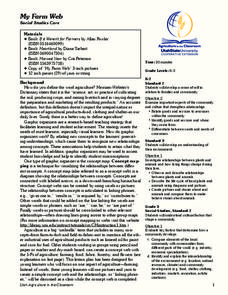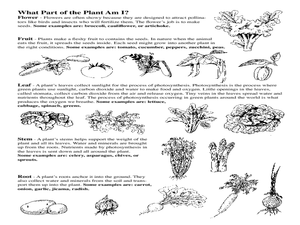Curated OER
My Farm Web
Students examine the role of agriculture in everyday life. In this agriculture activity, students read books such as Harvest Year and identify products which from from the farm. Students fill in a word web using the knowledge they gained...
Curated OER
The World At Your Fingertips
In this the world at your fingertips worksheet, students bring in 5 items from home that are not made in the U.S., then complete a chart, indicate on a map and answer 6 questions about imported items.
Curated OER
Perpetual Motion
Middle schoolers discuss movement of air currents and then experiment to create visible models of air currents. Students connect the model to weather patterns.
Curated OER
How - To - Posters
Students investigate the skills needed to survive for the early colonial settlers and Native Americans. They conduct research, develop a list of skills, and create a how-to poster demonstrating a survival skill.
Curated OER
Dried Vs. Soaked Beans
Students observe the differences between a dry and soaked bean, and identify the functions and parts of a bean at the beginning of its growth.
Curated OER
It's Your Choice
Students compare data and determine the appropriate way to organize the data. They use physical graphs, pictographs, and symbolic graphs to display their data. In addition, they complete a Venn diagram.
Curated OER
All About Plants
Young scholars identify plant needs. In this biology lesson, students watch All About Plants and then write a paragraph describing the various details about plants.
Curated OER
Hajigul's Story: A Creative Drama
Students listen to stories about and research the life of an Uighur child from China. They investigate their own cultural heritage and design a mural.
Curated OER
Malia
Fourth graders begin their examination of the Hawaiian Islands. Using their island bookmarks from a previous lesson, they work together to put the information into a book. They identify the physical and human characteristics of the...
Curated OER
Water Table
Students study the meaning of a water table and how it contributes to the existence of streams, swamps, and lakes in Nebraska. They conduct an experiment and complete a diagram of the hydrologic cycle.
Curated OER
Isolation of Synthetic Chemicals from Plant Leaves
Young scholars isolate and identify a dye, which represents a synthetic pesticide, from plants.
Curated OER
Crazy Critters
Eighth graders visit a local park to collect insects. They record the habitats, identify the insect and write a report including the kingdom, phylum, class, and order.
Curated OER
Insect Safari
Third graders name and identify three body parts of an insect, identify the characteristics that insects have six legs and one pair of antennae and categorize insects as to whether they are helpful or harmful.
Curated OER
A Seed Grows
Second graders begin the instructional activity by planting their own bean seed. Individually, they make predictions about how many leaves and roots their plant might grow and each day record their observations. They graph the results of...
Curated OER
The Human Cheek Cell
Students list the parts of cell theory and describe and define vocabulary. For this cell lesson students complete a handout that includes sketching a cell.
Curated OER
The Young Virginia Gardener:Growing Seeds Indoors
In this gardening worksheet, students read about growing seeds indoors, then complete 4 short answer questions based on the passage.
Curated OER
Plant Party
Students identify plant parts. In this plants instructional activity, students bring in a vegetable. Each student classifies which part of the plant their vegetable comes from (flower, root, ect.) Students identify the parts of their...
















